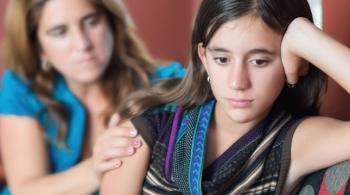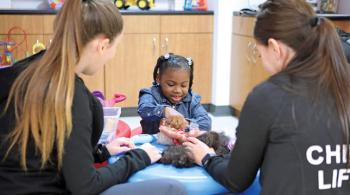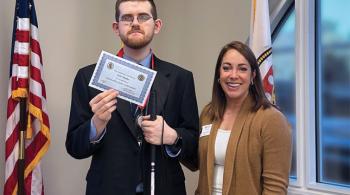BALTIMORE, September 27, 2023—As Suicide Prevention Month comes to an end, clinicians at Kennedy Krieger Institute want to remind parents to talk about this tough topic with their children and teens.
“It’s important that parents talk to their children about suicide and encourage their children to talk to them if they are thinking about suicide,” said Suzanne Rybczynski, MD, MSHCM, FAAP, Kennedy Krieger Institute faculty pediatrician and Maryland Chapter, American Academy of Pediatrics (MDAAP) Suicide Prevention Ambassador. “In the past, there was the mistaken belief that talking about suicide with our children encouraged suicide. We now know that parents should reinforce with their children that they can come to them if they are having thoughts of suicide.”
Between 2000 and 2018, youth suicide increased by 37 percent across the nation, according to the Centers for Disease Control (CDC). Between 2018 and 2020, that rate decreased by 5 percent; however, since then, it has returned to its peak, prompting Kennedy Krieger to host the first-ever suicide prevention summit at the Institute this summer, in collaboration with the MDAAP.
In attendance were clinicians, researchers, and advocates from 20 organizations, including AAP, NAMI, Nurse Practitioners of Maryland, Bloomberg School of Public Health, Johns Hopkins Center for Gun Violence Solutions, University of Maryland Pediatrics and Child and Adolescent Psychiatry, GBCM, Centro Sol, and various state agencies.
Following a day of discussions, the group established the following actionable goals:
- Increase coordination and collaboration between groups that serve youth in need of mental health services, including healthcare providers on all levels, government agencies, mental health advocacy groups, community groups, and schools.
- Increase awareness of suicide risk and prevention in youth, their families, and school staff.
- Promote knowledge of and use of 988 Suicide Crisis Hotline along with educational resources available for little or no cost.
- Advocate for additional resources for mental health care providers for youth.
“We will host similar summits in the future as we continue to work toward solutions to this crisis,” said Kristi Machemer, MD, FAAP, pediatrician, MDAAP Mental Health Committee Co-Chair, and an MDAAP Suicide Prevention Ambassador.
Other measures that parents can take include locking up all firearms in the home as guns are used in more than half of suicides committed by children and teens.
Additional resources on suicide prevention can be found at the following websites:
- Suicide: Blueprint for Youth Suicide Prevention, American Academy of Pediatrics (AAP)
- National Alliance on Mental Illness (NAMI)
For more information about the MDAAP’s Suicide Prevention Ambassador grant or any other MDAAP resources, contact Loretta I. Hoepfner, MDAAP Executive Director, at Loretta@mdaap.org.
###
About Kennedy Krieger Institute:
Kennedy Krieger Institute, an internationally known, non-profit organization located in the greater Baltimore/Washington, D.C. region, transforms the lives of more than 27,000 individuals a year through inpatient and outpatient medical, behavioral health and wellness therapies, home and community services, school-based programs, training and education for professionals and advocacy. Kennedy Krieger provides a wide range of services for children, adolescents and adults with diseases, disorders or injuries that impact the nervous system, ranging from mild to severe. The Institute is home to a team of investigators who contribute to the understanding of how disorders develop, while at the same time pioneer new interventions and methods of early diagnosis, prevention and treatment. Visit KennedyKrieger.org for more information about Kennedy Krieger.
MEDIA CONTACT:
Jessica Gregg
Greggj@KennedyKrieger.org
443-823-9811 (cell)
Jamie Watt Arnold
PROFILES
jamie@profilespr.com
410-243-3790















